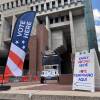The Jewish high holidays are upon us. Rosh Hashanah starts Sunday evening, and Yom Kippur is a week after that. However, new numbers suggests that white supremacist activity targeting Jews in Massachusetts is on the rise. Paul Singer with WGBH's New England Center for Investigative Reporting looked into those numbers. Singer spoke with WGBH Radio’s Arun Rath about what he found out. This transcript has been edited for clarity.
Arun Rath: So tell us about this uptick.
Paul Singer: Yeah, it's a dramatic increase in the number of these white supremacist propaganda incidents — that's people circulating material like neo-Nazi posters or leaflets. There were 35 of these incidents in 2018, the whole year. Already in 2019, according to the Anti-Defamation League, there have been 60 this year in Massachusetts. We're going to double last year's number.
Read more: Jews Prepare For High Holidays As White Supremacist Incidents Soar In Mass.
Rath: So what do we think is going on? I know that over the years there has been a rise in hate crimes, but this is a spike on top of that, right?
Singer: That's right, it seems pretty dramatic. I think part of the conversation is that people who have an ideology of hate are feeling empowered. It used to be they would talk to their friends about it. Then they were sharing their ideas online and through social media. Now, they actually appear to be empowered to go step out and do stuff; they're putting up posters, they’re talking to other people, and they're declaring themselves to be white supremacists and declaring their hatred.
Rath: We've seen some horrendous violence this year. Does that kind of snowball that?
Singer: Yeah, and that's the whole question, right? Do you just start ramping up to things? There were three incidents of attempted arson in Massachusetts at Jewish centers, Chabad houses. There have been spray-painted swastikas on historic properties. You start moving up that ladder and the concern is, When do we get to the point where violence is the next step on the ladder?
Rath: And with those worries, I know just in the temple that my family goes to in Lexington, like many other places, there's now security that we weren't used to seeing. You know at my son's bar mitzvah, there were security. We're not alone in this, right?
Singer: Oh no, that's right. There has been a lot of ramping up of security in synagogues over the years, and in mosques. But particularly after the shooting in Pittsburgh at the Tree of Life last year, a bunch of synagogues have made a great deal of investment in security. I spoke to Jeremy Yamin, who's the director of security for a group called Combined Jewish Philanthropies. According to him, it's not just about hardening the facility. "I can secure a synagogue and make it like a TSA checkpoint," Yamin said. "Everybody has to empty their pockets and go through metal detectors and all bags are x-rayed. That's not the goal. And if we did that and addressed the issue of people and firearms through that way, we would also be scaring off and turning away our flock."
Yamin talks about other, subtler things. Security is about having greeters at every door so that when a stranger comes to your door, you want to welcome them in, but you can ask them some questions to find out, 'Hi, are you new in town? What brings you here?' And you can sort of start to look for red flags that might suggest that they have evil intent.
Rath: In my temple, the security is not uniformed. You might even think that they're an usher if you weren't paying attention.
Singer: That's right. And I think that that is what Yamin was saying. Done right, security looks pretty friendly. It doesn't look like a fortress. It looks like just part of the welcoming process.
Rath: Is there any sense as to whether people are staying away from their temples out of fear?
Singer: Obviously there's no way for us to know that. But Robert Trestan at the Anti-Defamation League said the most important thing is that Jews go and pray. "I haven't heard of a single person who has said 'I'm not going to go to synagogue because I'm scared,'" Trestan said. "And I think it's critical that the community not be intimidated. And as Jews we should continue to practice our faith."
Rath: Now as we're talking about this and thinking back to that horrific shooting at the Tree of Life synagogue in Pittsburgh — what are they doing in terms of their security and dealing with this?
Singer: Well you know, that was my mother’s synagogue. Let me just say, she had not been going for quite a few years because of her illness, but her congregation was meeting in that building. That building’s still closed. It's fenced off. The congregation has been meeting other places around the city, and I was there a couple of weeks ago, and I was met by a guard at the front door before I walked in, which was off putting. I guess it was comforting in some ways, but it was off putting. But the Tree of Life congregation, there is a local Episcopal church that has reached out to them, and they'll be having their high holiday ceremonies there this year. And I think that speaks to the strength of that community.






